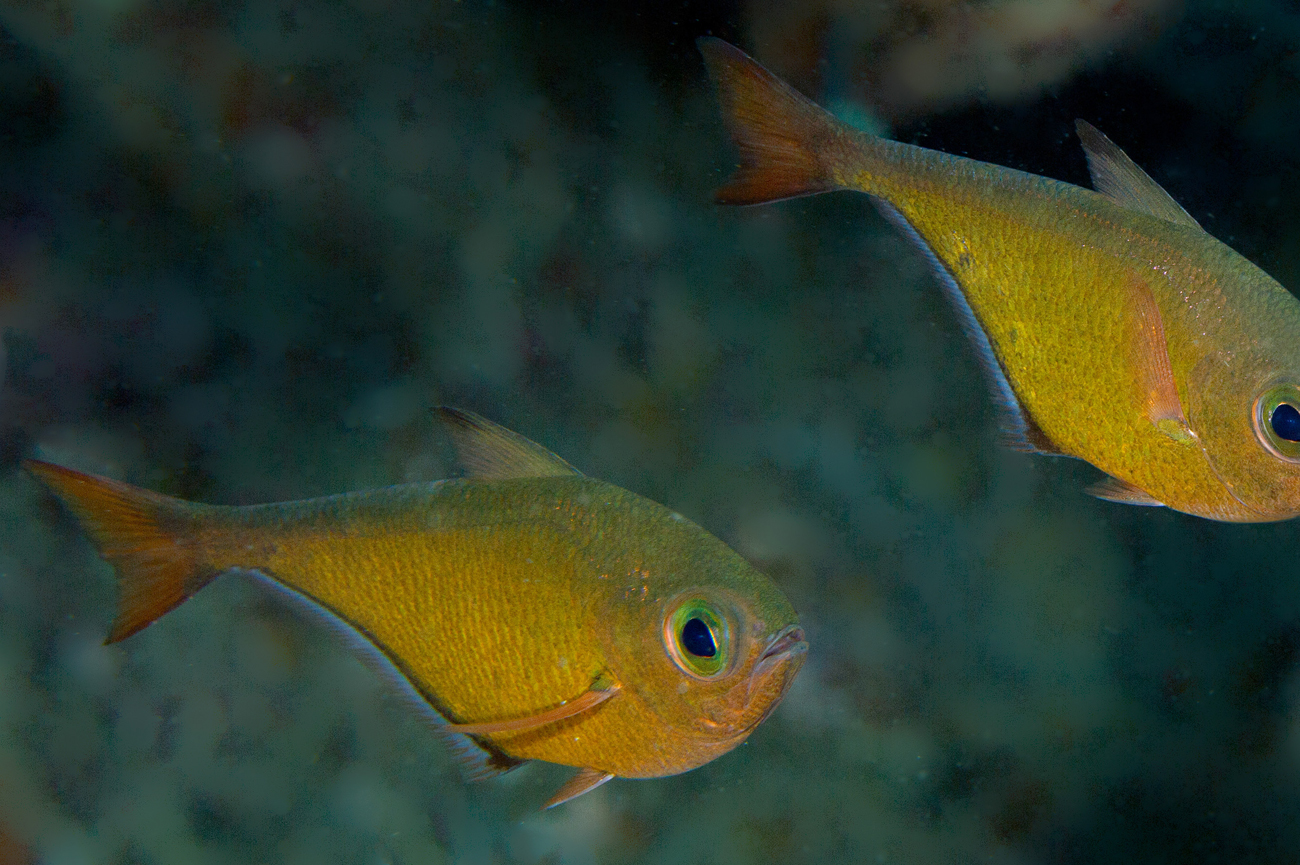Pempheris adusta Bleeker 1877

Dusky Sweepers, Pempheris adusta, at Anilao, Philippines, 2017. Source: Jim Greenfield / FishBase. License: All rights reserved
Summary:
A coppery sweeper with a dusky band along the anal-fin base, a faint blackish spot on the pectoral-fin base, and a blackish margin on the caudal fin.
Cite this page as:
Bray, D.J. 2021, Pempheris adusta in Fishes of Australia, accessed 06 Jul 2025, https://fishesofaustralia.net.au/home/species/5199
Pempheris adusta Bleeker 1877
More Info
|
Distribution |
Yirrkala, Northern Territory, to the southern Great Barrier Reef; also reefs in the Coral Sea, and Lord Howe Island in the Tasman Sea. Elsewhere the species occurs in the tropical, sub-tropical, east-Indo-west-central-Pacific. Forms large schools in caves, crevices or beneath overhangs during the day, emerging at night to feed on zooplankton in the water column. |
|
Features |
Dorsal fin VI, 8-10; Anal fin III, 36-45; Vertebrae 25; Lateral line (pored scales) 52-64; Scale rows above lateral line 4.5-6.5; Circum-peduncular scales 14-18 (usually 16). Body depth 41.4-45.4% SL; upper-jaw length 14.2-15.6% SL. |
|
Remarks |
Koeda et al. (2014) treated Pempheris flavicycla flavicycla as a synonym of P. adusta. Randall et al. (2014) questioned this usage of the name P. adusta by Koeda et al. (2014). However, as Randall et al. provided little information on the identification of Australian material, the name P. adusta is tentatively retained for Australian specimens pending further studies. |
|
Etymology |
The specific name adusta is derived from the Latin adustus (= browned, dusky, scorched,, swarthy). |
|
Species Citation |
Pempheris adusta Bleeker 1877, Archives Néerlandaises des Sciences Naturelles 12: 44. Type locality: Ambon Island, Molucca Islands, Indonesia. |
|
Author |
Bray, D.J. 2021 |
|
Resources |
Pempheris adusta Bleeker 1877
References
Allen, G.R. 1997. Marine Fishes of Tropical Australia and South-east Asia. Perth : Western Australian Museum 292 pp. 106 pls.
Allen, G.R. & Erdmann, M.V. 2012. Reef fishes of the East Indies. Perth : Tropical Reef Research 3 vols, 1260 pp.
Bleeker, P. 1877. Révision des espèces de Pempheris de l'Inde archipélagique. Archives Néerlandaises des Sciences Naturelles 12: 42-54 See ref at BHL
Bray, D.J. & Paxton, J.R. 2006. Pempheridae. pp. 1275-1279 in Beesley, P.L. & Wells, A. (eds) Zoological Catalogue of Australia. Volume 35 Australia : ABRS & CSIRO Publishing Parts 1-3, 2178 pp. (misidentified in part as Pempheris oualensis)
Heemstra, P.C. 1986. Family No. 216: Pempheridae. pp.668-669 in Smith, M.M. & Heemstra, P.C. (eds) Smith's Sea Fishes. Johannesburg : Macmillan South Africa xx + 1047 pp. 144 pls.
Koeda, K., Yoshino, T., Imai, H. & Tachihara, K. 2014. A review of the genus Pempheris (Perciformes, Pempheridae) of the Red Sea, with description of a new species. Zootaxa 3793(3): 301-330
Koeda, K., Yoshino, T. & Tachihara, K. 2013. Identificational keys of Pempheris adusta Bleeker, 1877 (Pempheridae) with comments on its standard Japanese name. Japanese Journal of Ichthyology 60(2): 123-128 https://doi.org/10.11369/jji.60.123
Kuiter, R.H. 1996. Guide to Sea Fishes of Australia. A comprehensive reference for divers and fishermen. Sydney, NSW, Australia : New Holland Publishers xvii, 434 pp.
Larson, H.K., Williams, R.S. & Hammer, M.P. 2013. An annotated checklist of the fishes of the Northern Territory, Australia. Zootaxa 3696(1): 1-293 (as Pempheris schwenkii)
Mooi, R.D. & Randall, J.E. 2014. Pempheris bexillon, a new species of sweeper (Teleostei: Pempheridae) from the Western Indian Ocean. Zootaxa 3780(2): 388-398
Randall, J.E., Victor, B.C., Alpermann, T.J., Bogorodsky, S.V., Mal, A.O., Satapoomin, U. & Bineesh, K.K. 2014. Rebuttal to Koeda et al. (2014) on the Red Sea fishes of the perciform genus Pempheris. Zootaxa 3887(3): 377–392 https://doi.org/10.11646/zootaxa.3887.3.5
Taylor, W.R. 1964. Fishes of Arnhem Land. Records of the American-Australian Scientific Expedition to Arnhem Land 4: 44-307 figs 1-68

